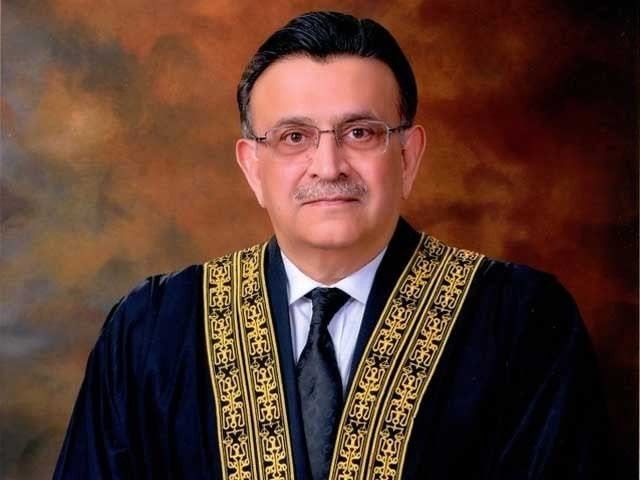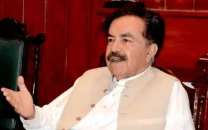Govt retaliated after SC ruling in Punjab CM case: CJ
Bandial says govt retaliated to apex court’s ruling over Punjab CM election

Chief Justice Umar Ata Bandial said on Monday the refusal of the government representatives in the Judicial Commission of Pakistan (JCP) to endorse elevation of his five nominees to the Supreme Court was linked to a court ruling regarding the Punjab chief minister’s election.
Addressing the opening ceremony of the new judicial year, 2022-23, the chief justice said that the court was committed to defending the Constitution in all its aspects and it would not hesitate to act if the Constitution or the constitutional institutions were undermined.
The chief justice pointed out that the political events taking place in the country since March had been accompanied by an avalanche of political cases, involving complex questions of constitutional law.
“One such case where the Court intervened was the ruling issued by the then Deputy Speaker of the Punjab Assembly on 22.07.2022,” Chief Justice Bandial said. “After a three day hearing the Court set aside the ruling of the Deputy Speaker and the result of the election on 26.07.2022.”
Continuing, he said that the decision prompted a sharp reaction from political quarters, who were disappointed by the judgment. He added that the displeasure of the federal government with the decision became evident two days later during a meeting of the JCP.
The commission, he said, had been convened to consider the names of five nominees for appointment to the Supreme Court. “These nominees were supported by four of the six Judicial Members of the Commission,” he added.
However, he continued, “the representatives of the Federal Government in the Commission either deferred or chose not to support the candidates proposed by the Chairman”, adding: “As a result, the meeting had to be adjourned.”
“I ponder, does such a reaction by the federal government to an adverse decision of the court reflect any respect for the rule of law and the independence of the judiciary? I simply leave the matter there,” the chief justice said.
Chief Justice Bandial also expressed surprise over the appearance of former Supreme Court Bar Association presidents regarding the constitution of the full court to decide the petition against the Punjab Assembly deputy speaker’s ruling.
“Nevertheless, it did surprise the court that during the hearing of the case the current and several past office-bearers of the bar approached the bench with a request for constituting a full court on the urging of the respondent leader of the political party that is also the principal member of the coalition in the federal government,” he said.
“No legal ground for doing so was given. The request was unexpected because the bar was pleading a partisan political cause without even being a party to the case,” he further said.
The chief justice told the ceremony that the apex court was committed to defending the Constitution in all its aspects – its commands and directions to the state and the people, the enforcement of fundamental rights and for the lawful functioning of all the institutions.
“The court will not hesitate to act if the constitution and/or the constitutional institutions are undermined, violated or attacked. The court is aware that the country is presently faced with serious economic and political challenges,” the chief justice said.
However, Chief Justice Bandial pointed out that the situation had become worse with the recent floods, which had displaced nearly 33 million people and engulfed almost one-third of the country under water.
“To help with the flood relief efforts, apart from making private contributions, the judges of this court have also voluntarily contributed an additional amount equivalent to their three days salary while the Supreme Court staff has donated their two days salary,” he said.
“However, despite generous donations from all quarters of the country, the incumbent government still faces a formidable task and the unenviable obligation to steer the country towards rehabilitation and recovery,” he added.
“In such conditions, the court urges all political parties, their leaders, all decision makers and privileged members of society to put aside their differences and grievances and to act in unity for the public interest and the national good.”
Chief Justice Bandial emphasised that the time had come to forget personal agendas and to work collectively for the nation-building. He assured that the court would continue to protect the Constitution and the fundamental rights assured to the people of Pakistan.
In this regard, the chief justice said, a Conference titled ‘75 Years of Pakistan’ is being held by the Law and Justice Commission later this month to examine the role to be played by the judiciary in shaping the future trajectory of Pakistan.
“One expects many valuable lessons to be recounted which will Insha’Allah guide the court to achieving the constitutional aspiration of dispensing inexpensive and expeditious justice to the people of Pakistan whilst also upholding the salient features of fundamental rights, rule of law and democracy.”
On the issue of population management, the chief justice said that extensive data had been collected from the Population Council and also data about the success of such programmes in other Muslim countries, such as Iran and Bangladesh.
“After consultation with the relevant stakeholders is completed the court aims to revive the proceedings in Human Rights Case No.17599 of 2018 (regarding alarming high population growth rate in the country) to issue appropriate directions to the said stakeholders for taking measures to facilitate voluntary management of the growth rate,” he said.
“Pakistan is a developing country with resources that are yet untapped for the nation’s prosperity. However, the fruits of progress are denied to the people due to the unchecked growth of our population,” he continued.
“Today we are dependent on imports for basic food items like wheat, edible oil and milk. Even the provision of basic services such as education, health and infrastructure, promised to the people by the Constitution under their right to life enshrined in Article 9, is challenging for the State.”
Chief Justice Bandial stressed the need for promoting resource generation and for curtailing import-based consumption. “The principal means to achieve both objectives is to have a skilled and productive population that does not consume more than the resources generated by them,” he added.
“This is a policymaking objective with which the court does not ordinarily interfere in deference to the principle of trichotomy of powers. However, to safeguard the right to life of the people, the court does possess jurisdiction to inquire from and direct the concerned persons and institutions to channel their energies towards this public interest initiative.”
The chief justice also addressed the issue of backlog of cases. He said that the backlog in the high courts, excluding the Sindh High Court, and district courts had been reduced to 2,038,013 on July 31, 2022 from 2,054,739 on February 28.
“I may at this point mention from the material that I have read that Bangladesh has a pendency of 3.93 million cases as of 31.12.2020 and India has a pendency of 47 million cases as of 02.08.2022 so in comparative terms we are much better off but I am glad the Bar is not satisfied and nor are we. Insha’Allah we will try to reduce the pendency further to provide expeditious justice to the people of Pakistan.”



















COMMENTS
Comments are moderated and generally will be posted if they are on-topic and not abusive.
For more information, please see our Comments FAQ